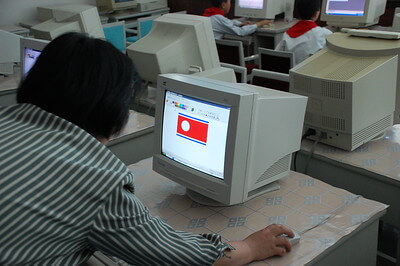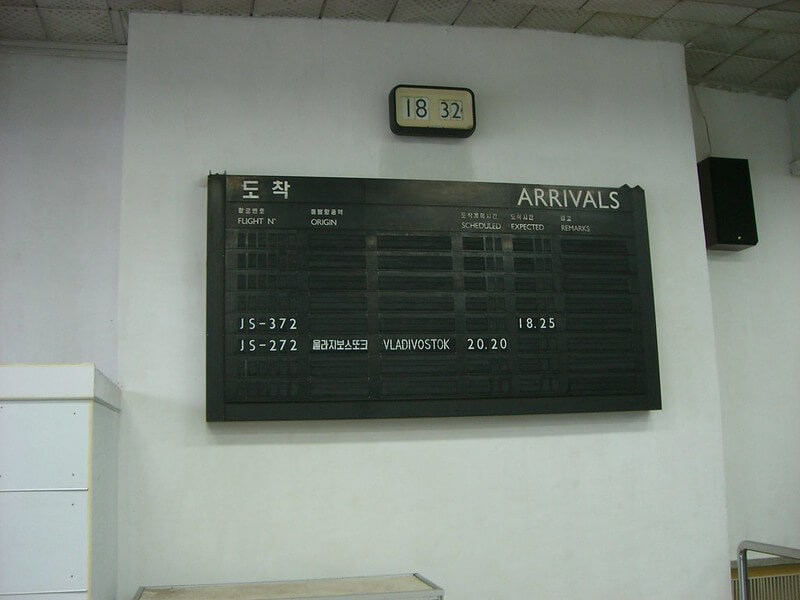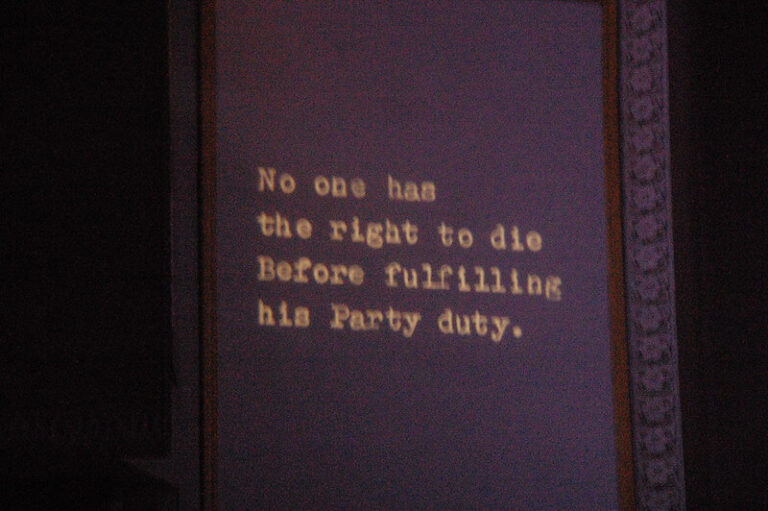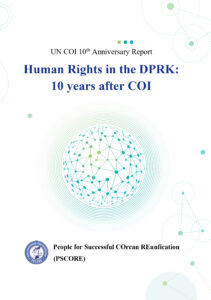Human Rights in the DPRK: 10 years after COI
The United Nations Commission of Inquiry (COI) on Human Rights in the Democratic People’s Republic of Korea was established in March 2013 to highlight that the human rights violations happening in North Korea are reaching crimes against humanity. However, even after the report’s release, the improvements have not been made, or it was minimal. Therefore, this report was created to re-establish and strengthen the capacity of North Korean human rights improvement activities.
Infringement of Freedom of Thought, Expression, and Religion
“Punishment has become stronger when watching foreign broadcasts. The number of controlling agencies, commerce and patrols has increased. At first, it was only 109 members, but now it is also handled by all those who inspect accommodation. It was previously handed over to 109 and could not be handled.” – Hyo-sung Joo
According to the defectors, the freedom of thought, expression, and religion has been increasingly restricted under the regime of Kim Jong-un. With the recent Anti-reactionary Ideology and Culture Denunciation Act, the authorities block access to external information and punish those who get caught after watching foreign broadcasts. It imposed harsh penalties, including life imprisonment and the death penalty. The crackdown extends to mobile phones and USB storage, and individuals who fail to educate their children correctly may face fines. Clothes and speech are also subject to control to prevent the spread of South Korean culture, and universities reportedly expel students who do not adhere to the correct ideological system.

Discrimination
“There is a wide gap between the powerful and the powerless within society. Apart from discrimination, I believe the ordinary people of North Korea are slaves to the party.”- Jin Kang
Discrimination in North Korea is based on the ‘songbun’ classification system, which categorizes individuals based on their family background, social status, occupation, and political ideology. Discrimination based on ‘songbun’ is prevalent, with individuals facing discrimination in access to education, military service, rations, and employment opportunities. However, origin-based discrimination decreased as wealth-based discrimination emerged. It also discusses two other issues in North Korea – regional discrimination and discrimination against persons with disabilities. Discrimination in the distribution of rations, power supply, and mobility persists, while discrimination against persons with disabilities is evident in the lack of support and social benefits, lack of equality in education, and negative public perception.
Infringement of Freedom of Movement and Residence
“Nothing has changed in policy, but daily life has changed. There was a time when a friend who went to another area for more than a year did not return. There is nothing that can’t be done with bribes, so the law is not very powerful” – Yuna Kim

North Korea is also violating the freedom of movement and residence rights of its citizens. The North Korean authorities restrict movement between provinces with a travel permit system and prohibit people from moving outside their area of residency. In principle, people need certificates to move, but it is possible to pay a bribe to bypass this system. The movement control was eased before COVID-19, but the pandemic has worsened the situation, with the movement of residents significantly dampened. The economic strain has had a significant impact on residents. Prices have inflated substantially around the border between North Korea and China, and residents who live on a daily income have suffered from starvation. Furthermore, there have been cases of forced deportation of impure forces stipulated by the authorities.
Infringement of Rights to Food and Related Rights to Life

“More and more people are starving to death. My uncle also died from COVID. It is said that there are cases of suicide because life is hopeless. A woman in her 70s committed suicide after taking medicine at night, and I heard that the head of the People’s Party (in charge) and the secretary of the city party’s organization are under review by the Central Party.” – Eun-duk Kim
The report also discusses the infringement of the right to food and related rights to life in North Korea. The right to food is recognized by international law and guaranteed by individual countries’ obligations. The North Korean government has failed to cooperate with the international community to resolve the food rights issues, resulting in major food crises, particularly among vulnerable groups such as children, the disabled, the elderly, and women. The food distribution system discriminates against residents based on class, region, and occupation. People starve to death due to the North Korean regime’s intentional neglect, and the vicious cycle of rural collapse and food shortages seems to be deepening. The problem persists due to the government’s policy of maintaining the system through an unequal distribution structure.
Arbitrary Detention, Torture, Execution and Political Prison Camps
“Whoever handles the case determines the gravity of the crime. North Korean officers of the law side with the judges. Even if one gets a lawyer, the lawyer will not defend their best interests. When I was arrested in 2017, I did not have a lawyer. The ability to hire an attorney when one finds oneself in an unjust situation is power in itself.” – Seon-joo Cho
The prevalent torture and arbitrary detention of political prisoners in North Korea violates the basic principles of human rights as per the International Covenant on Civil and Political Rights. Despite having its own regulations on torture and inhumane treatment, North Korea fails to comply with the principles of life and bodily autonomy. Punishment without trial and corruption in judicial proceedings are rampant. Although the level of violence has decreased, cases of torture and human rights violations continue to occur, and public execution is prevalent. The article concludes with an account of personal defamation and sexual harassment in rallying stations for repatriated defectors.
Status of the number of prisoners in North Korea’s political prison camps
| Camp Name | Location | No. of Prisoners | ||
|---|---|---|---|---|
| March 2020 | July 2021 | June 2022 | ||
| Camp No. 14 | Gaechon, South Pyongan Province | 43,000 | 43,000 | 36,800 |
| Camp No. 15 | Yodok, South Hamgyon Province | 55,000 | 56,800 | 42,900 |
| Camp No. 16 | Hwasong, North Hamgyong Province | 24,000 | 24,000 | 28,700 |
| Camp No. 17 | Gaechon, South Pyongan Province | 21,000 | 20,800 | 41,200 |
| Camp No. 18 | Pukchang, South Pyongan Province | 26,000 | 25,800 | 20,200 |
| Camp No. 25 | Chongjin, North Hamgyong Province | 40,000 | 41,000 | 36,000 |
| Camp Sungho-ri | Sungho, North Hwanghae Province | 21,000 | 0 | |
| Camp Pyongsan | Pyongsan North Hwanghae Province | Unknown | Unknown | |
| Total | 209,000 | 232,400 | 205,800 | |
Kidnapping and Forced Missing Foreigners
North Korea has been abducting foreigners and Korean nationals since 1950 as part of its state policy. The purpose of the kidnappings was to train spies and military schools, to prevent ethnic marriages with Koreans, and for general intelligence activities. The North Korean government has admitted to kidnapping many Japanese nationals, including Yaeko Taguchi, Megumi Yokoda, and Terakoe Takeshi. There are also concerns about the human rights violations of Koreans in Japan and their Japanese spouses. North Korea has continued to detain missionaries since 2013-2014. There have been cases of kidnapping of Korean nationals, including the hijacking of Korean Air flight YS-11 in December 1969. The victims have not been repatriated, causing international outrage.
Others, Labor Exploitation
“The forced labor was severe. They weren’t treating us as a human being, rather like an animal.”- Gil-soon Shim
According to the testimony, forced labor in North Korea is severe and dehumanizing. The country’s citizens are subject to a structured system in which they are mobilized for various efforts, including political education, group criticism sessions, and construction work. The mobilization of personnel to be dispatched to rural areas and construction sites is emphasized, with even children being forced to work. The COI report highlights the forced labor of prisoners in political prison camps and incarceration centers, while the exploitation of labor of ordinary residents and workers dispatched abroad is briefly mentioned. Various methods of exploitation of young children are also prevalent in North Korea, with schools becoming a channel of systematic exploitation.
Donate Now
Other types of Donations
Monthly Donation
Join our monthly donation program to give regularly. You can change it anytime.
Donate for Education
Help better equip students to go to university or pursue various careers.
You can see how we use your donations on our Donations & Expenditures page.

